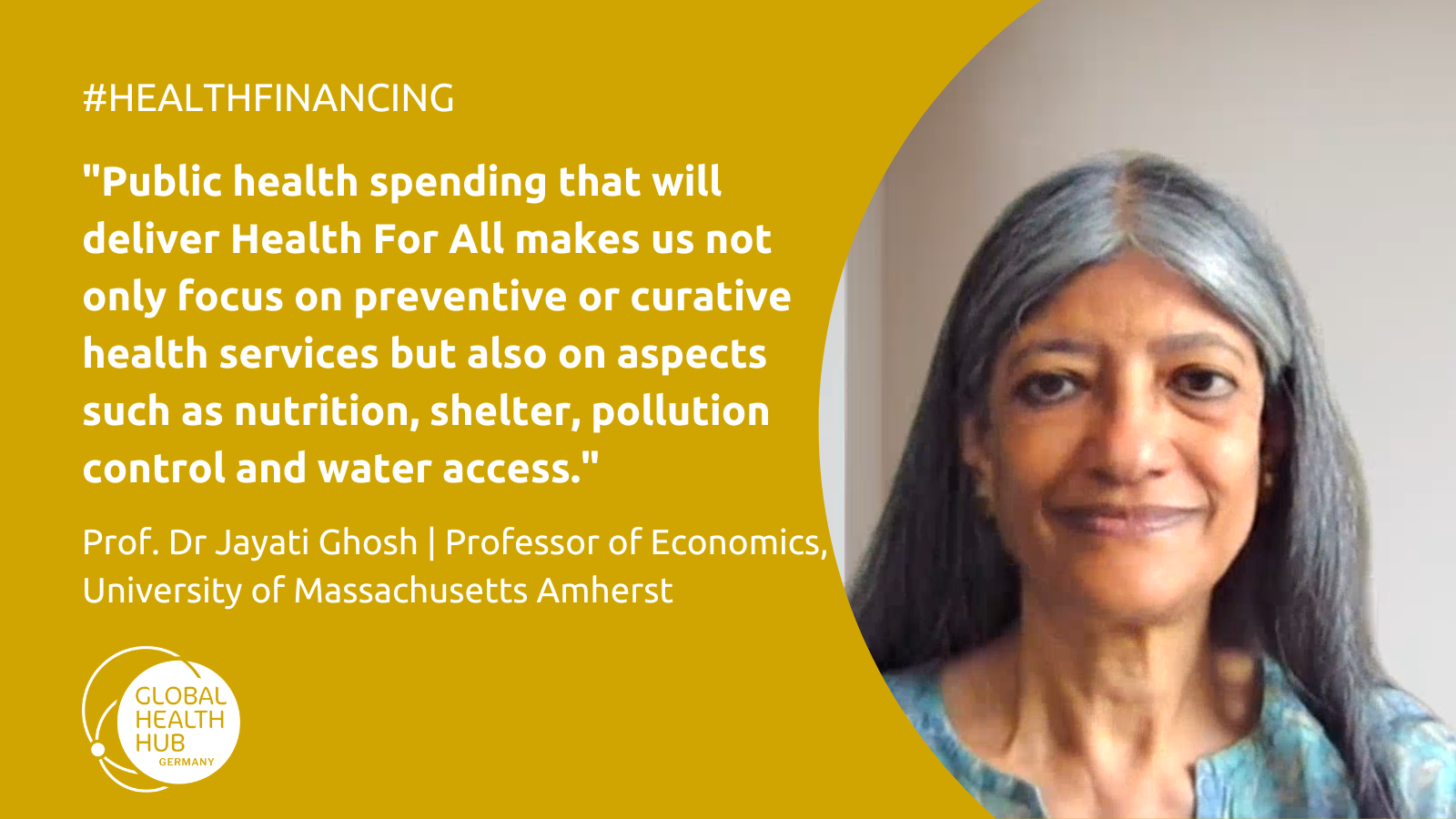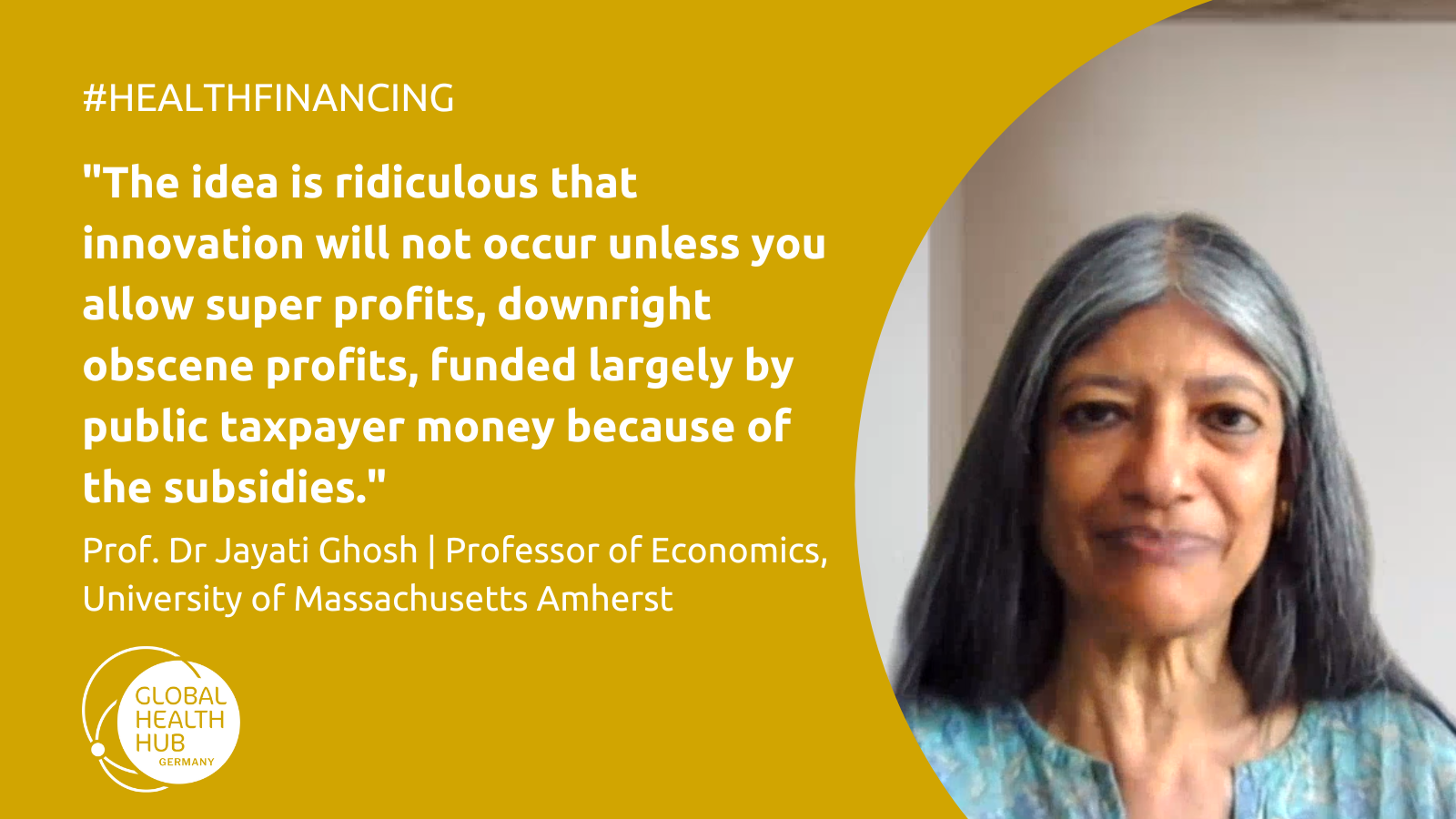Exclusive Interview: Renowned Economist Prof. Dr Jayati Ghosh on Global Health Financing
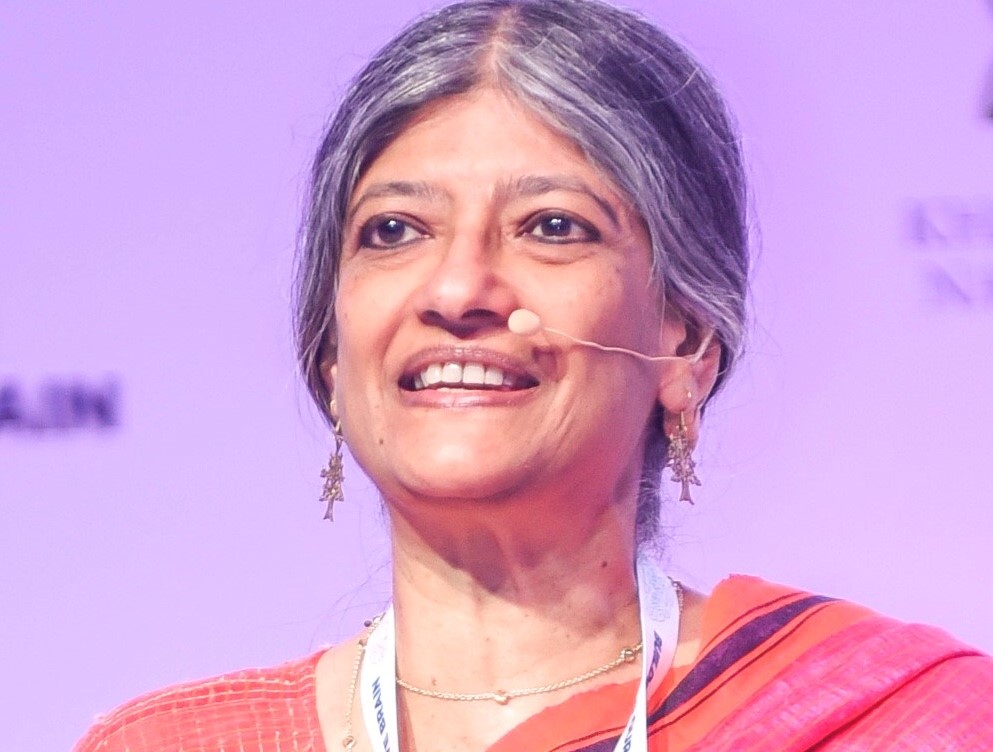
In an exclusive interview, Prof. Dr Jayati Ghosh, Professor of Economics at the University of Massachusetts Amherst and Member of the WHO Council on the Economics of Health For All, shares valuable insights on global health financing and learnings from the Covid-19 pandemic.
Renowned Economist Prof. Dr Jayati Ghosh is one of the five experts who participated in the new Catalyst Dialogue on the question "How to finance health for all in the context of scarcity?". Prior to the launch of the policy brief with the findings from the Catalyst Dialogue, we interviewed her on global health financing and lessons learned from the Covid-19 pandemic.
Read more on the Catalyst Dialogue
With the recent announcement on 5 May 2023 by the WHO declaring an end to the global Covid-19 Global Health Emergency, it is clear that the world is still grappling with the aftermath of the pandemic. The pandemic has shown the urgent need for a stronger health systems and better global health financing. What lessons can we learn from this crisis and how can we apply them to improve health financing in the future?
Jayati Ghosh: The pandemic really did expose the major deficiencies, flaws and gaps in our health systems globally, even in countries that we thought would be better equipped. Unfortunately, the lessons are not being learned. What are those most important lessons? The first is that most health provisioning, both preventive and curative, has to be in the public domain because the private sector is not interested in dealing with pandemic-like situations, in dealing with public health emergencies or in dealing with things that have a wider social impact. There are very large externalities in dealing with those and the private sector doesn't always get the gains. This is why you have to have public involvement. That's the first lesson we learned. Unfortunately, governments and economies are not learning that lesson. We are still not investing enough in public health or in the public health personnel that keep a system going. We are still underpaying them. We are still not providing them enough facilities and amenities. We are still not ensuring that they can do their job properly.
The second important lesson we learned is that medical innovation, for example vaccines, therapeutics and so on – we can do them if we get together. If governments put their mind to it, if they work with the private sector to ensure that there is a speed and scale of response, it can be done. We've had vaccines developed at the fastest ever rate that we have experienced and there was regulatory approval – even though very rapid – but nonetheless it was done. It means it can be done. We didn't do this for so many other diseases before and in poor regions of the world. We didn't do it for Ebola, we didn't do it for H1N1. So, we need to make sure that that happens. But we also need to make sure that when the public sector incentivizes the private sector, there must be conditions. What we did is, we handed over prior public knowledge and we gave subsidies – or rather the rich countries gave big subsidies, billions of dollars to major pharma companies and then gave them a blank check and said: “Fine, you control the technology, you can concentrate all the knowledge and you don't have to give licenses to anyone else. You can charge whatever price you like.” Now that's crazy. A government that is putting in most of the money and resources for developing something, must put conditions on the private sector, put a limit on the price, ensure a decent profit rate – and not exorbitant profiteering as we have had – and force the companies to share the technology so that it can be spread around the world.
You have already talked about the fact that there has to be more public involvement. Also, there should be more regulation when it comes to subsidies for the private sector. How do you perceive the effectiveness of instruments in this context such as the Pandemic Treaty and the International Health Regulations, currently under revision both to be adopted in 2024?
Jayati Ghosh: In a way, both the pandemic fund and the treaties that are being planned, all of them are essential, they're necessary. Unfortunately, they are hugely underfunded: promises are made, big announcements are made and then the money that comes in is relatively little. The Pandemic Fund said: “Okay, let's begin with ten billion dollars.” They've not managed to get more than two or three billion dollars. It's ridiculous that things which are seen and recognized by governments across the world to be essential are still not funded when so much money is available to fund fossil fuels, for example.
Also, there is the question of accountability, right? What requirements are needed to hold states accountable for complying with such regulations?
Jayati Ghosh: One of the big problems is that we have some systems of accountability for governments which are not adequate and there is certainly not enough "popular" accountability: They are not even accountable to their own people. Plus, there is little transparency in the deals that are struck. But the private sector has no accountability at all. Yet, they are beneficiaries of these regimes. They are often involved in lobbying for and influencing government policies and then they get a free pass to do what they like. So, it is very important to bring much greater accountability for both public and private actors. It can be done. We need much more public demand for it. We haven't had the kind of social mobilization that is necessary to make governments feel that they have to be accountable and that they have to put in accountability conditionalities for the private sector.
Talking about mainstream economies you advocate for challenging seemingly cast-in-stone assumptions. What means thinking outside the box specifically in global health financing?
Jayati Ghosh: It is interesting the way financing for global health is talked about. It is usually in terms of what health spending can do for the economy. So, for example there will be calculations of how much GDP is lost due to illness or how much expenditure is required to make GDP grow even further. This is the wrong way of looking at it. Economies are not the purpose of our social beings. Economies are there to serve societies and human beings. The purpose of an economy is to actually provide good material conditions for people who live in a society. So, we should be really thinking about what we want in a society. Supposing one of our goals is Health For All – which is a very essential and important goal – we should be thinking of the kind of economy that gives us Health For All. So that's a complete reversal of the way we normally think about health spending.
Public health spending that will deliver Health For All makes us not only focus on preventive or curative health services but also on aspects such as nutrition, shelter, pollution control, water access – so many different parts of human life are necessary for Health For All. And once you do that, then you're not thinking always in terms of: “Will this create more GDP?” Then we are asking: “Will this create a better society?” That completely changes the perspective on how you think of public financing. That in turn means that the public financing that you deem absolutely necessary to get Health for All has to be found somehow.
And the idea that there is no money is ridiculous. We have extreme concentrations of wealth. I'm not saying to tax everybody. Tax the extremely wealthy, the one percent of the population, sometimes even the 0.1 percent of the population. A small wealth tax on them will be enough. In India, if you tax less than a thousand families – just four percent of their wealth – you would get one percent of the GDP, which is double of all the public spending in India on health. So, you could actually do a lot if you start thinking in terms of health being the goal and the economy being designed to serve that goal. And that's of course the most sensible way of doing it. If somebody should come down from Mars, they would say: “Why haven't they done it?” – they would find it peculiar that we think completely the other way. Namely, that we are never thinking about the health of our citizenry, instead we're thinking about what that means for the economy. It's ridiculous and we really need to change that.
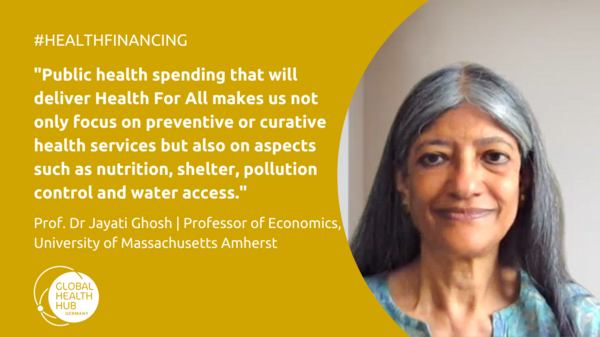
As a participant of the new Catalyst Dialogue on global health financing you discussed that an increase in tax revenues is on average the largest source of potential domestic fiscal space for health. By which other means can domestic taxation yield more resources for health?
Jayati Ghosh: As we live in a global world, it is also important for countries to share data, tax information or knowledge about the assets held by individuals. So, every country should be collecting data on wealth holdings such as financial wealth, property and other kinds of wealth. Creating these asset registers and sharing that information across tax authorities enables countries to tax the wealth of their tax residents wherever they choose to hold it. At the moment, they salt it away in different tax havens and we don't get the benefit. But the other major source of potential tax revenue is international corporate taxation.
We live in a very broken international system which was developed a hundred years ago. Developed when multinational corporations were not so important. And now, in fact, multinational corporations can get away with paying a fraction of the taxes that domestic companies pay. Why? Because they shift their profits around to low-tax jurisdictions. So, even if they are getting huge revenues in one country, they will claim that: “Oh no, our revenues are large here but our profits are very low because we have to pay for intellectual property patents that are held in the Netherlands or in Ireland or in the Cayman Islands or in Panama or in the Seychelles.” Hence, they will actually pretend that there are very few profits in higher-tax-countries and shift all of it to lower-tax-countries or zero-tax-countries, to tax havens. This has to be stopped and it can be stopped quite easily if we say: “Well, the multinational company is one global company. It's not different companies in different parts of the world.” Thus, every country should be taxing its share of the global profits. Based on a formula of sales-employment-assets. Once we do that, there are no advantages to shifting all these profits around. It is very easy. It is possible. It can be done with the political will.
Since the Hub addresses German policy makers and words should also be translated into action: what concrete demand do you have on Germany's role in global health financing?
Jayati Ghosh: Germany's role in global health could be much more significant in two ways. One of them is not related to finance. It is related to the intellectual property regime. Unfortunately, Germany has not played a good role here. They opposed the TRIPS Waiver in the WTO. In addition, they continue to protect the interests of major pharma multinationals over those of their own people, of their own citizens and, of course, the rest of the world. The idea is ridiculous that innovation will not occur unless you allow super profits, downright obscene profits, funded largely by public taxpayer money because of the subsidies.The German government should really drop that and enable a much more inclusive and democratic intellectual property rights regime that enlarges access to essential technologies: that's true for health, and that's true for a whole range of climate change technologies as well. Innovation is happening because of public support not because private companies need all the excess profits to innovate.
The second important area in which Germany can play a very big role, is in terms of these strategies for enabling health financing. Currently, there are two or three ways in which this works against the interests of essential spending on health. Per capita health spending and all the different kinds of public spending that are required to ensure Health For All – as I said nutrition, housing, sanitation, pollution control – all of these should be ring-fenced in terms of adequate and increasing public spending. For that you need a whole-of-government approach. You can't just say it has to be the health ministry alone. It has to be every ministry. It has to be a war room of government getting together to ensure that this is done.
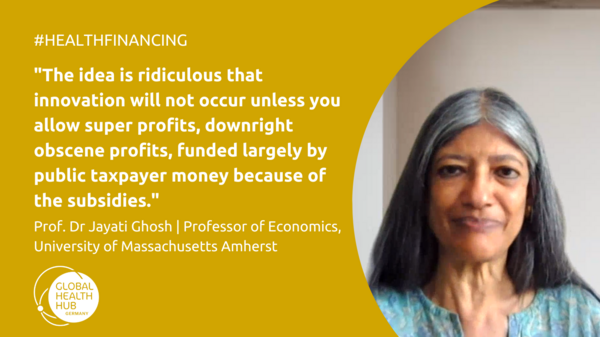
Germany has to play a much more open role and a much more positive role in institutions like the IMF. Unfortunately, the IMF has far too long represented the interests of a few rich countries, of the U.S. and some big EU countries. They really need to reform to stop pushing patterns of public spending that effectively imply cutting down on health spending in low- and middle-income countries. Wherever the IMF is operating today – even when they claim they are not asking for austerity, even when they say they have various measures for relief for the poor – what their strategy amounts to is a reduction in public health spending. And I would argue that all the big countries that are major shareholders in the IMF are complicit in this and therefore they're also responsible for this. So, the next health emergency when it happens – countries like Germany will also be culpable because they have allowed this to happen.
As a member of the WHO Council on the Economics of Health For All, your goal is to redefine Health For All as a public policy priority. Reflecting on the council's work and the final report which was released on May 23: if you could implement one global measure immediately, what would it be?
Jayati Ghosh: Wow, that is a very big question. I would opt for a set of measures that would enable a much more enlarged public spending on health and better quality of public spending so that we don't just direct it as subsidies to private companies without conditions. To ensure that it operates in the interests of the citizens and of society. To ensure a much more inclusive availability of Health For All.
This interview was conducted by Julia Schmitt.
Image source of the top picture: Jayati Ghosh
Exclusive Interview: Renowned Economist Jayati Ghosh on Global Health Financing
